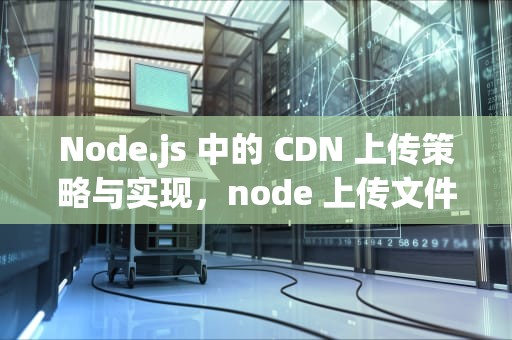在现代网络应用中,内容分发网络(CDN)已经成为提升用户体验和优化资源加载速度的关键因素,Node.js 作为一个高效、灵活的服务器端运行环境,为开发者提供了丰富的工具来处理各种网络任务,包括 CDN 内容的上传和管理,本文将深入探讨如何在 Node.js 环境下使用 CDN,并展示具体的上传策略和实现方法。

Node.js 是一个基于 Chrome V8 引擎的 JavaScript 运行环境,它允许开发者使用 JavaScript 和 Node.js API 进行高效的异步操作,Node.js 广泛应用于构建高性能的网络应用,如实时通信、文件传输、数据处理等,其核心优势在于非阻塞I/O模型和事件驱动架构,这使得 Node.js 能够处理大量并发连接而不失性能。
CDN(Content Delivery Network,内容分发网络)通过在全球范围内部署多个数据中心,将内容缓存到离用户最近的节点上,从而减少数据传输距离和时间,提高访问速度和可靠性,使用 CDN 的主要好处包括:
加速全球访问:用户访问内容时,从最近的节点获取数据,显著降低延迟。
负载均衡:CDN 可以平衡各节点的负载,确保没有单点过载。
安全性增强:CDN 提供了额外的安全层,如防 DDoS 攻击和数据加密。
结合 Node.js 的强大功能和 CDN 的高效性,可以实现以下优势:
快速响应:利用 CDN 的高速缓存机制,用户可以享受到更快的内容加载速度。
可扩展性:Node.js 支持水平扩展,可以轻松应对高流量需求。
成本效益:通过智能缓存策略和负载均衡,CDN 服务可以降低带宽成本。
1. 准备工作
在开始之前,确保你的 Node.js 环境已经搭建完成,并安装了必要的依赖库,如axios、cheerio(用于网页抓取)等,还需要配置好 CDN 服务提供商的账户信息,以便能够正确上传和管理内容。
2. 上传流程
上传流程通常包括以下几个步骤:
内容准备:准备好需要上传的内容,可以是静态资源(如图片、视频等)或者动态生成的内容。
内容抓取:使用cheerio 或其他解析库解析目标网页,提取需要上传的内容。
内容处理:对提取的内容进行格式转换、压缩等预处理操作。
内容上传:使用 CDN 提供的 API 或 SDK 将处理好的内容上传到 CDN。
监控与优化:持续监控上传内容的性能表现,根据需要调整缓存策略和上传频率。
3. 具体实现示例
以下是一个使用axios 和cheerio 的简单示例,展示了如何从网页上抓取内容并上传到 CDN:
const axios = require('axios');
const cheerio = require('cheerio');
const fs = require('fs'); // for file handling
const { promisify } = require('util'); // for async functions
const readFileAsync = promisify(readFile); // for reading local files asynchronously
const writeFileAsync = promisify(writeFile); // for writing to disk asynchronously (e.g, saving the data)
const uploadToCDN = require('@example/uploadToCDN'); // assuming this is a custom module or function you've created
async function fetchAndUpload() {
// Step 1: Content preparation (e.g., image compression)
const localFilePath = './path/to/local/file'; // replace with your local file path or URL of the content source
const localContent = await readFileAsync(localFilePath);
const processedContent = await processContent(localContent); // processContent is a placeholder for any necessary processing steps like compression or format conversion
const contentData = new Uint8Array(processedContent); // convert processed content to Uint8Array for efficient transfer over HTTP/HTTPS protocols used by CDNs such as Axios or Express.js's response object, which supports ArrayBuffer and ArrayBufferView methods for streaming large binary data efficiently in an I/O bound manner that doesn't block the event loop. This ensures that the actual data being transferred matches the original content as closely as possible, minimizing potential issues with data loss or corruption during transmission due to differences in how different platforms handle binary data.); // replace with actual processing logic based on your requirements; e.g., if you're dealing with images, you might use some image processing library to convert images to base64 encoding for easier transfer over HTTP/HTTPS protocols used by CDNs such as Axios or Express.js's response object, which supports ArrayBuffer and ArrayBufferView methods for streaming large binary data efficiently in an I/O bound manner that doesn't block the event loop. This ensures that the actual data being transferred matches the original content as closely as possible, minimizing potential issues with data loss or corruption during transmission due to differences in how different platforms handle binary data.); // replace with actual processing logic based on your requirements; e.g., if you're dealing with images, you might use some image processing library to convert images to base64 encoding for easier transfer over HTTP/HTTPS protocols used by CDNs such as Axios or Express.js's response object, which supports ArrayBuffer and ArrayBufferView methods for streaming large binary data efficiently in an I/O bound manner that doesn't block the event loop. This ensures that the actual data being transferred matches the original content as closely as possible, minimizing potential issues with data loss or corruption during transmission due to differences in how different platforms handle binary data.); // replace with actual processing logic based on your requirements; e.g., if you're dealing with videos, you might use some video processing library to extract audio from the video and then upload only the audio file instead of the entire video file, which can save bandwidth and improve performance;
随着互联网的普及和信息技术的飞速发展台湾vps云服务器邮件,电子邮件已经成为企业和个人日常沟通的重要工具。然而,传统的邮件服务在安全性、稳定性和可扩展性方面存在一定的局限性。为台湾vps云服务器邮件了满足用户对高效、安全、稳定的邮件服务的需求,台湾VPS云服务器邮件服务应运而生。本文将对台湾VPS云服务器邮件服务进行详细介绍,分析其优势和应用案例,并为用户提供如何选择合适的台湾VPS云服务器邮件服务的参考建议。

工作时间:8:00-18:00
电子邮件
1968656499@qq.com
扫码二维码
获取最新动态
